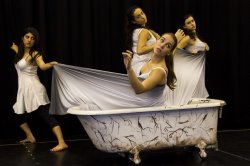Department of Theatre and Dance Students Stage “A Streetcar Named Desire” November 14-17
Renowned director/choreographer Kari Margolis’ production to be a “visceral, poetic and a multilayered investigation” of the American classic
Posted in: Department of Theatre and Dance News

Students in the Department of Theatre and Dance will perform Tennessee Williams’ classic tale, A Streetcar Named Desire, at the Alexander Kasser Theater from November 14-17.
In the director’s chair is renowned choreographer and director, Kari Margolis, with multimedia and soundscape by Tony Brown, both currently guest artists in the department. Asst. Prof. Heather Benton, Acting program coordinator, said the pair’s collaboration makes for an event that should not to be missed.
"One of the most exciting events happening within the department this year is having Kari Margolis and Tony Brown in residence to create their artistic take on A Streetcar Named Desire," Benton said.
Margolis, who’s been a guest artist in the Department since last year, is creator of the Margolis Method, a comprehensive methodology for training actors for the modern theatre now taught and recognized internationally, and co-founder and artistic director of the award-winning Margolis Brown ADAPTORS Company, founded in NYC in 1984. She directed the Department’s production of Insula, performed on campus last December, which was selected by the Kennedy Center to travel to its American College Theatre Festival (ACTF) regional festival held January in the nation’s capital. What’s more, the production went on to win three awards: Distinguished Production of a Devised Work , Distinguished Director of a Devised Work (for Margolis), and Outstanding Performance Ensemble.
Margolis said one of the reasons she chose Streetcar was because the main characters embody such a wide range of human — and not-so-human — qualities that they provide rich terrain to explore for her, as director, as well as for the actors.
"I just felt like the characters offer so much human expression, from the animalistic to what is it to hold so many lies inside of you, to be so fearful? What happens when we’re holding on for survival?" Margolis explained. "I think visually so, when I started to think about Stanley being so huge that, when he walks in the room, it could be like five people walking in the room. And I thought, ‘Oh. What would it be like if there were five Stanleys because he’s just that huge?’ And, then, thinking about Blanche as being this character in whom there’s always more than one thing going on. She’s saying one thing and meaning something else. You could feel the depth of her because there are so many levels of her. So the conceptual and the visual sort of came together for me for in this particular production," she added.
She said the work also allowed her to develop a theatrical experience in which the audience could "celebrate" the best — as well as the worst — of humankind vicariously through the characters.
"The point of theatre is to remind people of how we can really be,” Margolis explained. "And I want to make theatre where it’s like, when someone does something awful, or when someone does something beautiful, then the audience goes, ‘Yes, we can be that horrible. We can be that beautiful.’ But they’re celebrating their true humanity in a way that they don’t get to express in public."
She said she also welcomed the challenge posed by directing a classic that is as well known as Streetcar.
"One of the positive things about pop culture is that you can have 500 people from all walks of life sitting in a room together, and if you say, ‘Mary Poppins,’ it’s like 500 people all have a vision in their minds and they share that," Margolis explains. "So, culture starts to become something that, as a community, we share. On a higher, artistic level, when you take an American classic – like Streetcar – it’s the same kind of thing: People already come with a certain kind of bond that it is something that they share and they know.
"It also creates a really interesting challenge [for me], which is to make theater be what it’s really supposed to be: To make people see what they see everyday from a new perspective," she added.
Margolis said she counts three major influences on her work: Jerzy Grotowski, a Polish theatre director and innovator of experimental theatre and other related concepts; German poet and playwright Bertolt Brecht, who developed the "epic drama" style and contributed to dramaturgy and theatrical production; and Etienne Decroux, who has been called the father of modern French mime.
"The last 30 years, my life has been synthesizing those things and creating an actor who is the complete synthesis of those totalities," she said.
Benton agrees.
"One of the things that is really vital to the BFA program’s training at Montclair State and something [retired] Prof. Suzanne Trauth has really created in her legacy is an embracing of integration," explained Benton. "There really is a culture of integration within the program that the body, the voice, the mind, the soul are all connected. We separate them in America [but] they’re really all the same thing. It’s all happening at the same time. And that’s one of the things that I really appreciate about Margolis’s work because it really is about everything happening at the same time and getting as much depth and specificity and expression that she can out of these young students."
Benton, who recalls being "really blown away with [students’] level of specificity; depth that they were able to contact; focus; and ability to work as an ensemble" in last year’s Insula, said she expects Margolis’s Streetcar will be equally awesome.
"Kari Margolis is a particularly distinguished guest director with a strong national and international reputation," Benton said. "Her vision for Streetcar promises to be a visceral, poetic, multi-layered investigation of a cherished Tennessee Williams classic."
"A Streetcar Named Desire" will be performed November 14 and 15 at 7:30 p.m.; November 16 at 2 and 8 p.m.; and November 17 at 1 p.m. For more information, including purchasing tickets, visit here. Read an article on Baristanet here.
